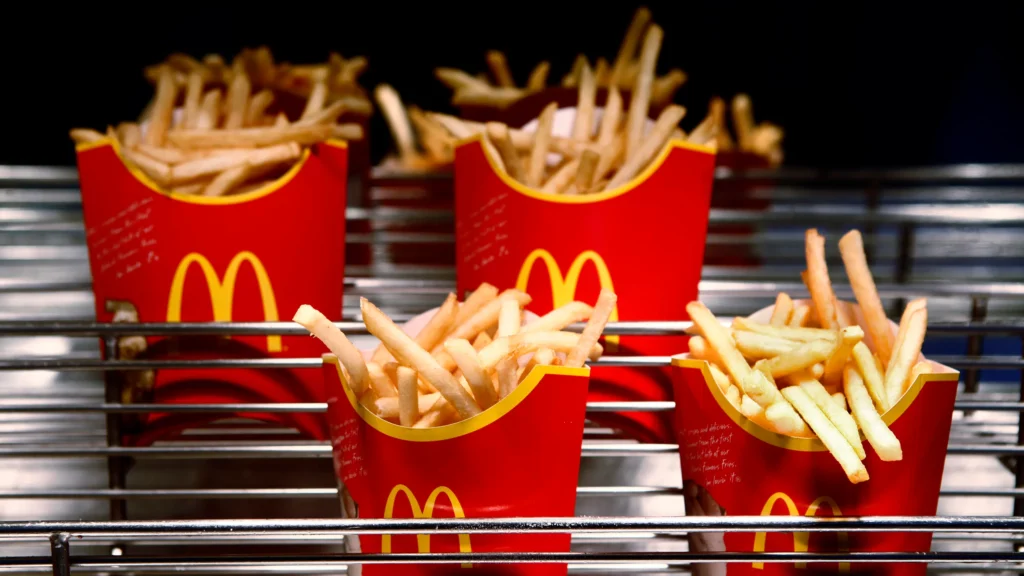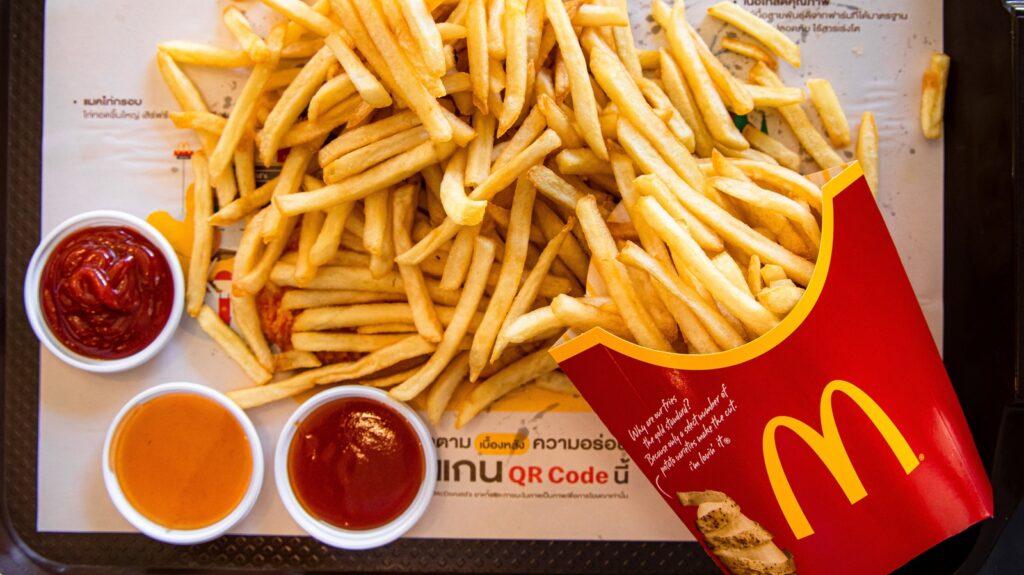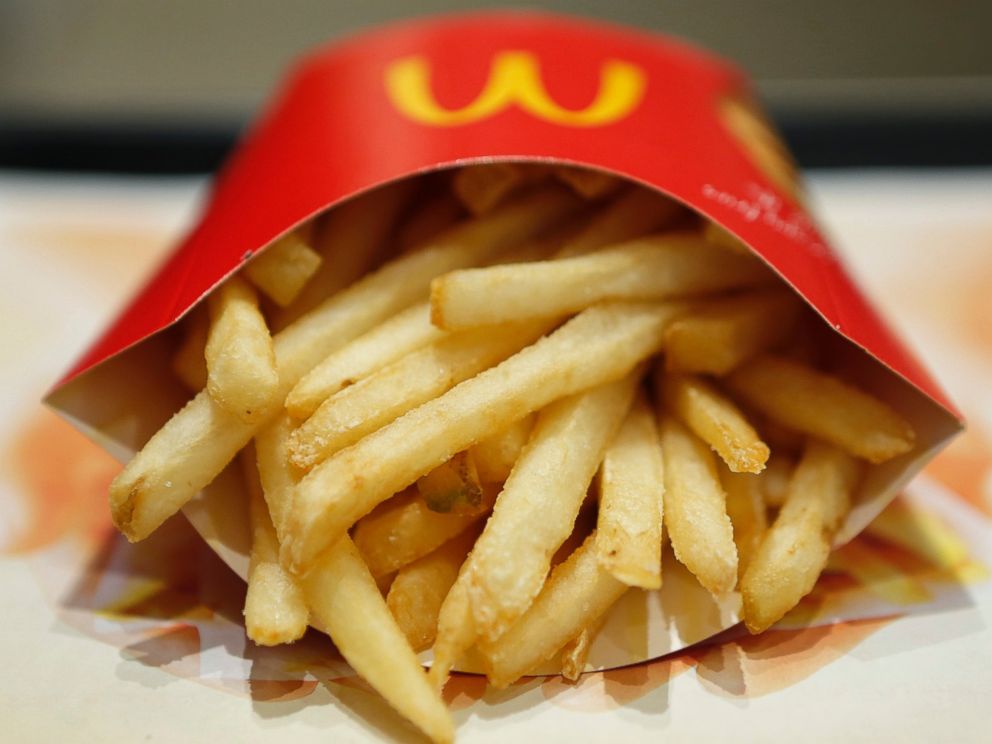Are McDonald’s fries halal? This question has been a topic of discussion and concern for many individuals seeking halal food options. In this blog post, we will explore the halal status of McDonald’s fries both in the United States and around the world. Additionally, we will delve into the complexity of dietary accommodations in the fast food industry, as well as other halal options that McDonald’s has to offer. So, if you’re curious about the halalness of McDonald’s fries, keep reading to find out all the juicy details.
McDonald’s Fries: A Global Halal Conundrum?

mcdonalds fries
McDonald’s, the multinational fast-food behemoth, has infiltrated nearly every corner of the globe with its iconic offerings. Among them, McDonald’s fries have garnered an almost cult-like following. These golden, crispy slices of potato perfection have left millions of taste buds tantalized and wanting more. However, for the Muslim community worldwide, the question that lingers is: Are McDonald’s fries halal?
This seemingly simple question is of paramount importance to Muslims who abide by the strict dietary laws of Halal. Halal, an Arabic term meaning ‘permissible,’ refers to food and drinks that are lawful under Islamic dietary laws. However, the halal status of McDonald’s fries is not a straightforward answer, and it varies significantly from region to region.
The intricate process of preparing and serving food at McDonald’s, a global chain with diverse local adaptations, makes the question of halal even more complex. There are several factors to consider, including the ingredients used, the method of preparation, and the potential for cross-contamination. For instance, the fries’ halal status can be influenced by whether animal-based ingredients are used, how the fries are fried, and even how they are served.
Interestingly, the debate over the halal status of McDonald’s fries has sparked conversations and controversies in various regions. It’s not just about the fries; it’s about the broader issue of how global fast-food chains can accommodate diverse dietary requirements while maintaining their standardization and efficiency. This question is particularly relevant in today’s globalized world, where food habits and religious beliefs intersect in complex ways. Learn how many calories do medium fries have and enjoy them with your favorite McDonalds meal.
So, are McDonald’s fries halal? The answer, it appears, depends on where you’re eating them. This uncertainty underscores the need for greater transparency and accommodation in the fast-food industry, particularly when it comes to respecting religious dietary laws. As the world becomes more interconnected, the challenge for global brands like McDonald’s is to strike a balance between maintaining their signature taste and catering to diverse dietary needs.
The Intricacies of McDonald’s Fries in the United States

mcdonalds fries
For the ardent followers of halal food residing in the United States, the news may come as a disappointment that the iconic McDonald’s fries do not meet the halal criteria. The primary obstacle in achieving the halal status lies in the unique recipe of these world-renowned fries.
One of the vital ingredients that make these fries so addictive is the ‘natural beef flavoring.’ This flavoring, unfortunately, does not adhere to the halal guidelines, making the fries non-halal. The inclusion of this ingredient in their recipe has an interesting backstory.
Once upon a time, McDonald’s used to fry their golden fries in beef fat, which bestowed upon them a rich, savory flavor that became a trademark taste for McDonald’s fries. However, as health concerns regarding the consumption of saturated fats gained momentum, McDonald’s had to make a strategic switch. They replaced the beef fat with a healthier alternative – a blend of canola oil, which is low in saturated fats.
But, there was a challenge. The change in frying medium threatened to rob the fries of their signature taste. To counter this, McDonald’s introduced natural beef flavoring in their recipe. This ingenious move ensured that the fries retained their beloved taste while adhering to health standards.
However, this compromise between health and taste came at the cost of the fries’ halal status in the United States. The natural beef flavoring, although instrumental in maintaining the rich taste, is not halal, making the fries unsuitable for consumers following a halal diet.
This complex issue of balancing taste, health, and diverse dietary needs is a testament to the challenges that global food chains like McDonald’s face. It underscores the need for these brands to continually innovate and adapt to cater to the evolving preferences and requirements of their diverse customer base.
Global Variations: The Halal Status of McDonald’s Fries

mcdonalds fries
When it comes to the halal status of McDonald’s fries, the geographical location plays a significant role. The halal status varies from one country to another due to the difference in preparation methods and ingredients used. Let’s take a closer look at how McDonald’s in different countries approach this issue.
In the United Kingdom, for instance, McDonald’s has taken considerable steps to accommodate the dietary needs of its Muslim customers. The fries served in the UK are purely vegetarian, free from any animal-based ingredients, including natural beef flavoring. McDonald’s UK even goes a step further by using separate fryers to eliminate any chances of cross-contamination, ensuring that their fries align with halal dietary laws. This pro-active approach has been praised by many for its respect towards diverse dietary preferences.
Onto Canada, the scenario presents a bit of a gray area. While the fries in Canadian McDonald’s do not contain any animal-based ingredients, the company explicitly states that they are not certified halal. This stance leaves room for doubt and uncertainty due to the potential risk of cross-contamination. The fries may, therefore, not be completely halal-friendly, which could be a concern for strict adherents of the dietary law.
Down under in Australia, the fries are also devoid of any animal-based ingredients. However, they are not officially certified as halal, and separate fryers are not used. This increases the chances of cross-contamination, making the fries a potentially risky option for halal eaters. It underlines the need for more stringent measures to ensure the fries meet halal standards.
Meanwhile, in India, McDonald’s has a strict policy of separating vegetarian and non-vegetarian foods. This measure ensures that their fries are halal as no cross-contamination occurs, providing peace of mind for their Muslim customers.
Overall, the halal status of McDonald’s fries is a complex issue that varies from country to country. It underscores the importance of transparency and accommodation in the fast-food industry, especially when catering to customers with specific dietary requirements. If you like this post check out when does McDonalds serve lunch and visit our site for more similar posts.
Exploring More Halal Choices at McDonald’s
While the halal status of McDonald’s fries may vary across different regions, it’s comforting to note that the fast-food giant offers other halal-friendly options on its menu. These choices are not only delicious but also cater to the dietary needs of individuals who strictly adhere to halal guidelines.
One such prime example is the chain’s apple slices – a fresh, healthy, and halal-certified snack. These crisp, juicy slices are free from any animal-derived ingredients, making them a safe choice for those adhering to halal dietary rules. They are also an excellent way for parents to introduce healthier food options to their children while dining out.
Another popular option is McDonald’s McCafe beverages. From aromatic coffee to indulgent milkshakes, these beverages are devoid of any non-halal elements. They are prepared with careful attention to ensure that they meet the halal standards. So, whether you’re craving a caffeine kick or a sweet treat, these beverages can satisfy your needs without compromising your dietary beliefs.
Moreover, the Baked Apple Pie stands out as a delightful dessert option that is halal compliant. This scrumptious pie lacks any animal-based ingredients, making it a guilt-free indulgence for those following a halal diet. Its crispy, golden crust filled with tender, flavorful apples makes it a hit among patrons of all ages.
It’s also worth noting that while the natural beef flavoring disqualifies McDonald’s fries from being halal in the United States, it also means they are not vegan. However, on a positive note, these fries are gluten-free, making them a suitable choice for those following a gluten-free diet. This demonstrates McDonald’s ongoing efforts to cater to diverse dietary needs and preferences.
Overall, McDonald’s commitment to providing a variety of halal options reflects its dedication to inclusivity and customer satisfaction. It’s a testament to the brand’s understanding and respect for different cultures and dietary practices worldwide.
The Intricacies of Meeting Dietary Requirements in Fast Food Chains
In today’s globalized world, fast food chains like McDonald’s serve a diverse range of customers, each with unique dietary needs and preferences. This diversity has brought to the forefront the challenging issue of meeting various dietary accommodations, as highlighted by the ongoing debate about the halal status of McDonald’s fries.
While McDonald’s fries are not halal in certain parts of the world, such as the United States, due to the inclusion of natural beef flavoring, the fast-food giant has made commendable strides towards providing halal options for their Muslim patrons. This is evident in countries like India, where strict policies are implemented to separate vegetarian and non-vegetarian foods, ensuring the fries are halal and free from cross-contamination.
However, it’s not just about the fries. McDonald’s has gone beyond the golden arches of its iconic fries to offer a variety of other menu items that comply with halal dietary laws. From apple slices and McCafe beverages to the Baked Apple Pie, McDonald’s has demonstrated its commitment to inclusivity and customer satisfaction by expanding its halal-friendly options.
Nonetheless, the debate surrounding the halal status of McDonald’s fries continues to simmer. It’s a complex issue that underscores the intricacies of catering to diverse dietary needs in a fast-paced, fast food environment. Therefore, it is always advisable for Muslims to consult with their respective religious bodies when in doubt about the halal status of any food item.
As we navigate this global culinary landscape, it’s heartening to see multinational chains like McDonald’s taking significant steps to acknowledge and respect cultural diversity and religious beliefs. Their efforts to cater to the dietary requirements of their diverse customer base exhibit a commitment to inclusivity that goes beyond just serving fast food.
This discussion around McDonald’s and its halal offerings is a testament to the growing demand for dietary accommodations in the fast food industry. It is a reminder that food is more than just sustenance; it’s a reflection of our diverse cultures, beliefs, and lifestyles.
FAQ & Users Questions
Are McDonald’s fries halal?
No, McDonald’s fries in the United States are not halal. They contain natural beef flavoring which is not halal.
Do McDonald’s fries contain animal-based ingredients?
Yes, McDonald’s fries in the United States contain natural beef flavoring which is derived from beef.
Are McDonald’s fries halal in other countries?
McDonald’s fries may be halal in other countries where there are strict policies regarding the use of animal-based products in food.
Do McDonald’s fries in the United Kingdom contain animal-based ingredients?
No, McDonald’s fries in the United Kingdom do not contain any animal-based ingredients and are considered halal.
Do McDonald’s fries in Canada contain animal-based ingredients?
No, McDonald’s fries in Canada do not contain any animal-based ingredients. However, there is a possibility of cross-contamination.
Are McDonald’s fries vegan?
No, McDonald’s fries in the United States are not vegan because they contain natural beef flavoring. The same may apply to fries in other countries.
Are McDonald’s fries gluten-free?
No, McDonald’s fries in the United States are not gluten-free because the natural beef flavoring added to them contains wheat derivatives. The gluten-free status may vary in other countries.
What halal options are available at McDonald’s?
Some halal options at McDonald’s include apple slices, McCafe beverages, baked apple pie, and certain desserts. However, the meat options are not halal.
Are McDonald’s fries suitable for vegans?
No, McDonald’s fries in the United States are not suitable for vegans as they contain natural beef flavoring. The same may apply to fries in other countries.
Is there a risk of cross-contamination with non-halal ingredients?
Yes, there is a risk of cross-contamination with non-halal ingredients in McDonald’s fries in countries like Canada and Australia, even though the ingredients themselves may not be animal-based.
